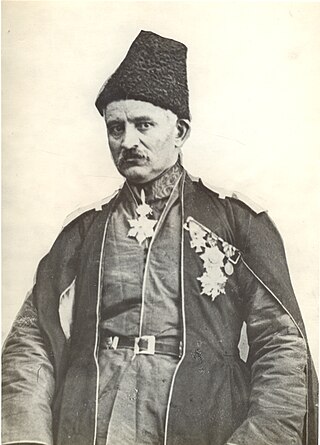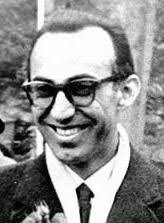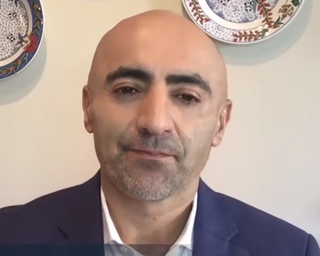Related Research Articles
Islamism is a religio-political ideology. The advocates of Islamism, also known as "al-Islamiyyun", are dedicated to realizing their ideological interpretation of Islam within the context of the state or society. The majority of them are affiliated with Islamic institutions or social mobilization movements, often designated as "al-harakat al-Islamiyyah." Islamists emphasize the implementation of sharia, pan-Islamic political unity, the creation of Islamic states, and rejection of non-Muslim influences—particularly Western or universal economic, military, political, social, or cultural.
Sectarianism is a debated concept. Some scholars and journalists define it as pre-existing fixed communal categories in society, and use it to explain political, cultural, or religious conflicts between groups. Others conceive of sectarianism as a set of social practices where daily life is organised on the basis of communal norms and rules that individuals strategically use and transcend. This definition highlights the co-constitutive aspect of sectarianism and people's agency, as opposed to understanding sectarianism as being fixed and incompatible communal boundaries.

Liberalism in Iran or Iranian liberalism is a political ideology that traces its beginnings to the 20th century.

Kemalism or Atatürkism is a political ideology based on the ideas of Mustafa Kemal Atatürk, the founder and first president of the Republic of Turkey. Its symbol is the Six Arrows and is currently one of the two main ideologies of Turkey alongside Erdoğanism.
Kurds in Iran constitute a large minority in the country with a population of around 9 and 10 million people.
Janet Afary is an author, feminist activist and researcher of history, religious studies and women studies. She is a professor and the Mellichamp Chair in Global Religion and Modernity at the University of California, Santa Barbara (UCSB).

Mirza Fatali Akhundov, also known as Mirza Fatali Akhundzade, or Mirza Fath-Ali Akhundzadeh, was a celebrated Iranian Azerbaijani author, playwright, atheist, philosopher, and founder of Azerbaijani modern literary criticism. He became famous mainly for his European-inspired plays written in Azerbaijani..

Fereydun Adamiyat or Fereidoon Adamiyat was a leading social historian of contemporary Iran and particularly the Qajar era. He was the son of Abbasquli Adamiyat, a pioneer of the Iranian Constitutional Revolution. Fereydun Adamiyat received his B.A. from the University of Tehran and his PhD in diplomatic history from the London School of Economics. He is known for his original works on various aspects of the social and political history of Persia, most of them dealing with the ideological foundations of the Iranian Constitutional Revolution. Believing firmly in history's "Rational Movement", Adamiyat saw no conflict between normative judgement and claims to objectivity. Although predominantly published in Persian, he is often cited by Western scholars. His most famous book was Amir Kabir and Iran.

Ervand Abrahamian is an Iranian-American historian of the Middle East. He is Distinguished Professor of History at Baruch College and the Graduate Center of the City University of New York and is widely regarded as one of the leading historians of modern Iran.

Soner Cagaptay is a Turkish-American political scientist based in the United States. He is director of the Turkish Research Program at the Washington Institute for Near East Policy. He is a historian by training and is an expert on Turkey–United States relations, Turkish politics, and Turkish nationalism.

Iraqi nationalism is a form of nationalism that asserts the belief that Iraqis form a nation and promotes the cultural unity of Iraqis of different ethnoreligious groups such as Mesopotamian Arabs, Kurds, Turkmens, Assyrians, Yazidis, Mandeans, Shabaks and Yarsans.

The Sublime State of Iran, commonly referred to as Qajar Iran, Qajar Persia, the Qajar Empire, Sublime State of Persia, and also the Guarded Domains of Iran, was the Iranian state under the rule of the Qajar dynasty, which was of Turkic origin, specifically from the Qajar tribe, from 1789 to 1925. The Qajar family took full control of Iran in 1794, deposing Lotf 'Ali Khan, the last Shah of the Zand dynasty, and re-asserted Iranian sovereignty over large parts of the Caucasus. In 1796, Agha Mohammad Khan Qajar seized Mashhad with ease, putting an end to the Afsharid dynasty. He was formally crowned as Shah after his punitive campaign against Iran's Georgian subjects.
The Principlists, also interchangeably known as the Iranian Conservatives and formerly referred to as the Right or Right-wing, are one of two main political camps in post-revolutionary Iran; the Reformists are the other camp. The term hardliners that some western sources use in the Iranian political context usually refers to the faction, although the principlist camp also includes more centrist tendencies. The camp rejects the status quo internationally, albeit tends to preserve it domestically.
Moderate Socialists or simply Moderates Party, was a political party in Qajari Persia and one of the two major parties of the constitutional period alongside its parliamentary rival Social Democratic Party–Democrat Party. It was Iran's first right-wing political party.
The Oudh Bequest is a waqf which led to the gradual transfer of more than six million rupees from the Indian kingdom of Oudh (Awadh) to the Shia holy cities of Najaf and Karbala between 1850 and 1903. The bequest first reached the cities in 1850. It was distributed by two mujtahids, one from each city. The British later gradually took over the bequest and its distribution; according to scholars, they intended to use it as a "power lever" to influence Iranian ulama and Shia. The attempts by the British to disburse the Oudh Bequest was one of the principle causes of the rise of the Society of Islamic Revival in 1918.
League of Socialists of the National Movement of Iran or League of Iranian Socialists was a socialist nationalist party in Iran.

Socialism in Iran or Iranian socialism is a political ideology that traces its beginnings to the 20th century and encompasses various political parties in the country. Iran experienced a short Third World Socialism period at the zenith of the Tudeh Party after the abdication of Reza Shah and his replacement by his son, Mohammad Reza Pahlavi. After failing to reach power, this form of third world socialism was replaced by Mosaddegh's populist, non-aligned Iranian nationalism of the National Front party as the main anti-monarchy force in Iran, reaching power (1949–1953), and it remained with that strength even in opposition until the rise of Islamism and the Iranian Revolution. The Tudehs have moved towards basic socialist communism since then.
Ali Gheissari is an Iranian historian and sociologist. He is research associate of history at the University of San Diego and has research interest in the intellectual history of modern Iran and in modern philosophy and social theory. He has been visiting professor of religious studies at Brown University, Iranian Studies at St. Antony's College, Oxford, and History of Modern Iran at the University of California, Irvine. He is known for his works on the intellectual history and politics of modern Iran. He is on the Editorial Board of Iran Studies book series published by Brill, and has served as the Editor-in-Chief of the journal Iranian Studies.

Rudolph P. Matthee, best known as Rudi Matthee, is John and Dorothy Munroe Distinguished Professor of History in the History Department at the University of Delaware, teaching Middle Eastern history and specializing in the history of early modern Iran. He received his PhD in 1991 from the University of California. Matthee is a member of the Association for the Study of Persianate Societies, for which he also functioned as president twice in 2003-2005 and 2009–2011. He is the author of numerous books and articles on Safavid and Qajar Iran.

Qanun was a monthly newspaper which was published in London during the period 1890–1898. The founder and editor of the paper was Mirza Malkam Khan who served as the Qajar Iran's envoy to Britain and Italy. It is known to be the first oppositional publication of Iran and was one of the publications which improved the political awareness of Iranians.
References
- ↑ Chatterjee, Kingshuk (November 2016). "Vanessa Martin , Iran between Islamic Nationalism and Secularism: The Constitutional Revolution of 1906 (London: I.B.Tauris, 2013). Pp. 286. $110.00 cloth. ISBN: 9781780766638". International Journal of Middle East Studies . 48 (4): 789–791. doi:10.1017/S0020743816000970. ISSN 0020-7438. S2CID 163827005.
- ↑ Sohrabi, Nader (24 January 2015). "Iran between Islamic Nationalism and Secularism: The Constitutional Revolution of 1906 by Vanessa Martin (review)". The Middle East Journal . 69 (1): 144–146. ISSN 1940-3461.
- ↑ Abrahamian, Ervand (4 May 2017). "Iran Between Islamic Nationalism and Secularism: The Constitutional Revolution of 1906". Iranian Studies . 50 (3): 474–476. doi:10.1080/00210862.2017.1285597. ISSN 0021-0862. S2CID 164568824.
- ↑ Azimi, Fakhreddin (April 2015). "Vanessa Martin. Iran between Islamic Nationalism and Secularism: The Constitutional Revolution of 1906". The American Historical Review . 120 (2): 751–752. doi:10.1093/ahr/120.2.751.